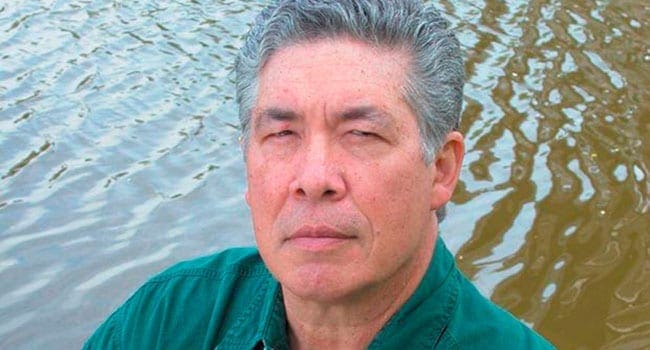The Inconvenient Indian
By Thomas King
Penguin Random House Canada

There are many cheery stories in Canadian history. They focus on the Order of Good Cheer, the adventures of the Company of Adventurers, Radisson and des Groseilliers, and so on.
It’s possible that Indigenous author Thomas King sought a counterbalance as he wrote The Inconvenient Indian (A Curious Account of Native People in North America). The book was first published in 2012. King’s thesis and purpose are captured in the title and subtitle of his book.
People can be in the way. In this book, it’s Indians (his term), and their being in the way was and is inconvenient for progress, settlement and industrialization.
Several Indians help King arrive at his point: elimination. The Dead Indian is the caricature in the cigar store, frozen in time. Live Indians are disappearing. Status and Legal Indians have been the subject of “enfranchisement,” which turns an Indian into a Canadian citizen.
Marrying “out of Status for two generations” also creates non-Status Indians. Assimilation may result in there being “no Status Indians left in Canada” in a generation or so. With the status gone, the land is gone too – ripe for “estate lots and golf courses.”
This is King’s concern: the disappearance of Indigenous peoples and their lands.
It’s a “Curious Account” in part because King’s writing style is post-modern and in the trickster tradition. He’s like the comedian who makes an audience think about serious things, Pablo Picasso making a gallery-goer wonder why those people look so funny and Antoni Gaudi’s weird buildings fixating viewers.
King causes readers to think again about familiar people and events, and see them as manifestations of the public policy goals of extinction, elimination and control over Indigenous people.
His great CBC Radio series The Dead Dog Café Comedy Hour caused both thinking and laughing at the same time.
King’s trickery begins early in his book. He invokes collaborator Helen, not yet identified as his wife but only as a family member. She advises not to begin his history with Columbus. He agrees she gives good advice. The very next paragraph begins with Columbus. Readers know they’re in for a ride.
Part of the ride is tallying up the toll in massacres of original peoples by settlers and settlers by Indigenous peoples. He actually turns such massacres into comedic theatre when he cites the case of a rifle falling over and “soldiers, unable to see in the dark … shooting at each other until there was almost no one left.” This ghoulish exercise doesn’t lead to a pox on both houses, but the inexorable conclusion that settlers were just better, more mechanized and had thoroughly pondered justifications for their actions.
As for losing status after two generations of marrying out, King documents the draconian rules but also mocks it with the skill of Vaudevillian: “I claim to be a male but in fact only one of my parents was male.”
King is funny but not fooling around.
It turns out a lot of history is just “made up and told to someone else” and then taken as “historical fact.” Most readers have heard of Pocahontas, but perhaps not that Capt. John Smith made up a story about being saved by such young women in Turkey, Russia and France, and that Pocahontas was likely 10 years old when they met.
Many such stories are harmless enough but King transitions to a larger purpose when he notes “the Hudson’s Bay Company didn’t own the land they sold to the Canadian government, any more than the French owned the land they sold to the Americans.”
If readers have misconceptions on the small details, they may also have missed the big picture. King leads us through the details to the countless injustices and atrocities. Along the way he offers some balance, noting that the Cherokee had slaves and he thinks Riel was “ill-advised” to execute Thomas Scott.
This book is like a physician’s consultation. Both begin with pleasantries. For King, it’s a story about forming a band that the members considered calling Pesky Redskins. If there’s some self-deprecating humour on page one, how tough could his account be?
But he’s using the misdirection of the magician and does so brilliantly throughout. It’s deception because the subject matter is indeed tough, as a physician’s diagnosis often is. The physician who begins with “don’t buy green bananas” might not hold the attention of the dying patient. So might the Indigenous advocate who has the word genocide in the first sentence.
King does hold attention, right through to the reader confronting the notion of genocide – inescapable, historical, legal genocide.
With a light and conversational style, he’s able to take readers ever more deeply into shocking and disturbing events. On the way, we find that well-known public figures are Indians (humourist Will Rogers) and well-known actors who play Indians are not (Iron Eyes Cody).
For readers of a certain age, it’s laugh out loud time when he notes that “in the late ’60s and early ’70s in North America … [e]veryone wanted to be an Indian. Even the Indians.”
While laughing, we confront the expropriation of culture, that not all imitation is flattery, and the emerging pride and power of Indigenous peoples.
A thoughtful reader must confront that this is about pain, death, legislated extermination, elimination, residential schools and such. The reader is only reading about victimization, not actually being victimized. King may be asking readers to cope with not having to cope with the horrors he’s described.
King slips back and forth across the U.S.-Canada border, which long post-dates Indigenous peoples. We know of Custer, Cornwallis, President Jackson, General Sherman, Teddy Roosevelt and other historic figures, so don’t feel ambushed. Yet King can shock with quotes and context to show these people’s imperfections, ranging from insensitivity, incompetence, exclusionary behaviour, through to racism and genocide.
He writes with ease about U.S. Supreme Court decisions, paternalistic policies, the forced surrender of Indigenous land and how the first concentration camp in North America housed Indigenous people on Deer Island in Boston Harbour.
An uneconomical anthropologist might write a journal article on Indigenous diversity. Economical King just notes that “there never has been a good collective noun because there never was a collective to begin with.”
King has studied and taught at good state and regional universities in California, Utah, Lethbridge, Alta., and Guelph, Ont. He assumes readers will recognize the reference to W.B. Yeats and Joan Didion in the oblique “slouching towards Wounded Knee.” He assumes we know George Santayana and will enjoy his turning the famous phrase on its head: “Those who understand the lessons of history are only too happy to repeat them.”
He likens Indians to the characters in the play Waiting for Godot. Godot never arrives; for Indians, Europeans never leave. Moreover, Indians were not waiting for European civilization.
There are scant in-text references, no footnotes and no bibliography. King is a trustworthy narrator but an assertion is not a proof. Footnotes or bibliography would have been helpful.
The reference to “[m]ore than one scholar” asserting that treaties were never meant to be kept because “[n]ative people would be gone …” intrigues but doesn’t prove. Ditto the “[v]arious stories” in which signatories to treaties were drunk or intimidated.
King, or probably his publisher, went to the trouble of producing A Discussion Guide of more than four pages near the end of the book. This is no doubt to encourage its use in schools.
Citations or a bibliography would support an educational norm: incidental learning. This is the unplanned spurt of learning occasioned by a stimulating book. Good teachers encourage this. Restricting the learning experience to this one text misses an opportunity.
So read this book. Teach from this book. And let it point to further study.
Dr. Allan Bonner, MSc, DBA, is a crisis manager based in Toronto.
Allan is a Troy Media Thought Leader. Why aren’t you?
The views, opinions and positions expressed by columnists and contributors are the author’s alone. They do not inherently or expressly reflect the views, opinions and/or positions of our publication.

